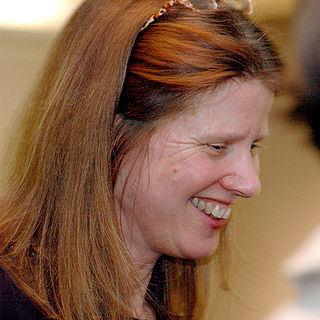A Quote by Alan Moore
Everything you've ever read of mine is first-draft. This is one of the peculiarities of the comics field. By the time you're working on chapter three of your masterwork, chapter one is already in print. You can't go back and suddenly decide to make this character a woman, or have this one fall out of a window.
Related Quotes
I had read [Charles] Dickens's novels were often published serially. I thought it would be fun to write a book, just sitting down and writing a chapter every day, not knowing what would happen next. So that's how I wrote the first draft. And then of course I had to go back and make sure everything worked and change things.
If God is an author and the universe is the biggest novel ever written, I may feel as if I'm the lead character in the story, but like every man and woman on Earth, I am a suporting player in one of billions of subplots. You know what happens to supporting players. Too often they are killed off in chapter 3, or in chapter 10, or in chapter 35. A supporting player always has to be looking over his shoulder.
I would look at the first chapter of any new novel as a final test of its merits. If there was a murdered man under the sofa in the first chapter, I read the story. If there was no murdered man under the sofa in the first chapter, I dismissed the story as tea-table twaddle, which it often really was.
The idea was that we would decide the order when we looked at the proofs. I remember Brion Gysin saying "Well, why change it? It's perfect the way it is, the way it came from the printer." Made one major change, that is, the first chapter that came from the printers, which would be the beginning, we moved to the end. The first chapter became the last chapter. There's no actual cutups in Naked Lunch.
The two mistakes that come to mind are people who introduce a flood of characters in the first few pages. Where the reader has to stop and get out a flow chart and has to figure out who is who. And you just can't do that - introduce the first four generations of a character's family in the first chapter. You can introduce four or five characters at the most in the first chapter. Another mistake is to use big words that are not normally used in conversation to try to impress folks with your vocabulary.
If Mother Culture were to give an account of human history using these terms, it would go something like this: ' The Leavers were chapter one of human history -- a long and uneventful chapter. Their chapter of human history ended about ten thousand years ago with the birth of agriculture in the Near East. This event marked the beginning of chapter two, the chapter of the Takers. It's true there are still Leavers living in the world, but these are anachronisms, fossils -- people living in the past, people who just don't realize that their chapter of human history is over. '
There are several studies done of peasant uprisings where the first chapter might be 'conditions in that area' and so the conditions are bad, and then the second chapter is a kind of conjectural event, somebody's shot and then there's an uprising. But there's no consideration, no chapter on preparation.
What I do usually is read the book first, for pleasure, to see if my brain starts connecting with it, as a movie. And then, if I say yes, I read it again, only this time I take a pen and, inside the book, I say, "Okay, this is a scene. I don't need this. I'm going to try this. I'm not going to take this." And then, I use that book like a bible and each chapter heading, I write a menu of what's in that chapter, in case I ever need to reference it. And then, I start to outline and write it. I get in there and it starts to evolve, based on having re-read it again.




































